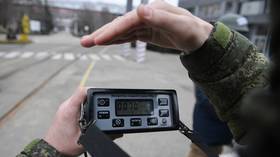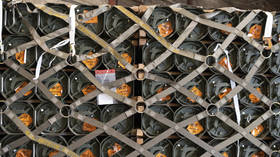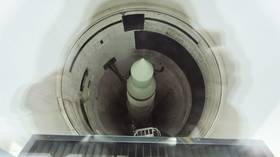US plans WMD 'provocation' to frame Russia – Moscow

Russia has accused the US of planning to use weapons of mass destruction (WMD) in Ukraine in order to frame Moscow. The US is preparing “a provocation aimed at accusing the Russian armed forces of using chemical, biological, or tactical nuclear weapons,” Lieutenant General Igor Kirillov, the head of the Russian Radiation, Chemical and Biological Protection Force, said on Saturday.
According to Kirillov, the supposed plans include “three scenarios.” The most probable scenario, he said, is a false-flag attack on civilians, or “an act of sabotage on Ukrainians sites, which were involved in the development of the components of weapons of mass destruction.”
Kirillov claimed that the potential targets are the Zaporozhskaya Nuclear Power Station, which has been controlled by Russia since early March, and the site of a former chemical plant in Kamenskoye in eastern Ukraine.
The RBK Ukraine media outlet reported last year that the plant in Kamenskoye was used for uranium enrichment in Soviet times and still contains nuclear waste. Kirillov said the Russian Defense Ministry obtained a document which shows that the facilities there are in critical condition.
The second option mentioned by Kirillov involves “discreetly” using WMDs “in small quantities.” He claimed that the Pentagon initially planned to deploy WMDs in Azovstal, a large steel mill in the Azov Sea port of Mariupol.
While Russian and Donbass troops largely control the city, a handful of Ukrainian troops and civilians remain holed up in the mill, mostly underground. On Thursday, Russian President Vladimir Putin called off the assault on the mill, opting for a blockade instead.
The last option is what Kirillov called “an open use of WMDs on the battlefield.” He said it could be used in the Donbass towns of Slavyansk and Kramatorsk, which are close to the frontline and controlled by Kiev. Kirillov called this scenario “the least probable.”
The general said that last month, Russian intelligence services found three spray drones in Ukraine’s southern Kherson Region. He argued that the UAVs could be used to spray “biological agents and toxic chemicals.” Kirillov claimed that vials with an unknown substance were airdropped on Thursday on Russian troops. The vials are being studied by the Defense Ministry, he said.
Kirillov noted that Russia disposed of all of its chemical weapons in 2017, while the Soviet Union scrapped its biological weapons program in 1972.
Moscow previously claimed that Ukraine had maintained US-funded biological weapons research programs, citing what it said were documents from the country’s several laboratories. Ukrainian President Volodymyr Zelensky strongly denied these allegations, saying the labs were only conducting “ordinary scientific research.”
In an interview aired on CNN last week, Zelensky said “all countries have to be worried” that Russia might use nuclear or chemical weapons.
Izumi Nakamitsu, the UN’s top disarmament official, said last month that the organization was “not aware” of any biological weapons programs in Ukraine.
In March, US diplomat Victoria Nuland testified before the Senate that the US was working with Kiev “to ensure that the materials of biological research do not fall into the hands of Russian forces.” The State Department, however, said the allegations of the US and Kiev conducting “chemical and biological weapons activities in Ukraine” were “outright lies.”
Russia attacked the neighboring state in late February, following Ukraine’s failure to implement the terms of the Minsk agreements, first signed in 2014, and Moscow’s eventual recognition of the Donbass republics of Donetsk and Lugansk. The German and French brokered protocols were designed to give the breakaway regions special status within the Ukrainian state.
The Kremlin has since demanded that Ukraine officially declare itself a neutral country that will never join the US-led NATO military bloc. Kiev insists the Russian offensive was completely unprovoked and has denied claims it was planning to retake the two republics by force.















